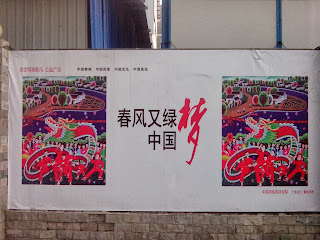Through the International Students' Association, I had the opportunity this week to participate in a radio interview. The show is called "The Sound of Youth" and is a daily program focusing on activities and stories from Changchun's plethora of universities. In our interview, three Chinese students from our association as well as another foreign student, Hadi, and myself discussed life in China and the importance of our club's activities for foreign students. Our hostess particularly enjoyed asking Hadi and I about our experiences studying Chinese and living in China. At one point, she even asked the other students to talk about both Hadi and I as individuals. If it had been television, you would have seen me blushing profusely.
The whole time I kept imagining Changchun's taxi drivers joining in the program. "Not bad," they'd think. "They speak Chinese pretty well," their passengers would reply. Maybe one of the millions out there would wonder, "Have I driven these Lao wai before?"
Unfortunately for my readers, this interview was all done in Chinese (with the exception of my little English side notes). Nevertheless, if you'd like to listen to it, you can visit their webpage and click on 2013-10-24. (In case you can't remember what my voice sounds like, I'm the slow one that stutters). You might want to skip ahead five or ten minutes past the commercials, or even three-fourths of the way through where they have me sing a song in Chinese. Otherwise, enjoy all the incomprehensible rhythms and the tones! Also, my various tunnels past the Great Firewall have all been failing me lately, so pictures will have to come later.
The whole time I kept imagining Changchun's taxi drivers joining in the program. "Not bad," they'd think. "They speak Chinese pretty well," their passengers would reply. Maybe one of the millions out there would wonder, "Have I driven these Lao wai before?"
Unfortunately for my readers, this interview was all done in Chinese (with the exception of my little English side notes). Nevertheless, if you'd like to listen to it, you can visit their webpage and click on 2013-10-24. (In case you can't remember what my voice sounds like, I'm the slow one that stutters). You might want to skip ahead five or ten minutes past the commercials, or even three-fourths of the way through where they have me sing a song in Chinese. Otherwise, enjoy all the incomprehensible rhythms and the tones! Also, my various tunnels past the Great Firewall have all been failing me lately, so pictures will have to come later.
































